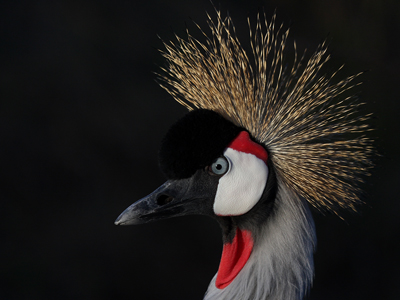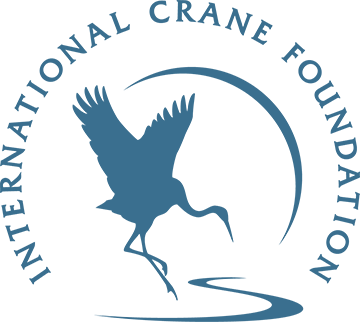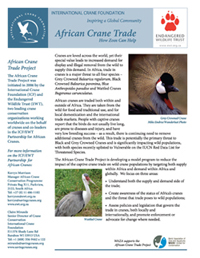| FOR IMMEDIATE RELEASE For more information: Sara Gavney Moore, Communications Specialist (608) 356-9462 ext. 155 Baraboo, WI, November 4, 2014 – Rhinos and elephants aren’t the only animals threated by wildlife trafficking – illegal capture and trade is also causing the Endangered Grey Crowned Crane to disappear from Africa. In response to this threat, the International Crane Foundation (ICF) and our partner based in South Africa, the Endangered Wildlife Trust (EWT), provided joint testimony with the American Bird Conservancy on crowned cranes and macaws to the recent Presidential Advisory Council on Wildlife Trafficking hearing in Washington D.C. Testimony on bird trafficking issues was specifically requested by Council members, who realize that they need to look beyond the more publicized rhino and elephant trafficking issues.  “The ability to partner with American Bird Conservancy to share this important message at this level of the U.S. government is key to raising awareness about the impact of illegal trade on cranes,” Kerryn Morrison, Manager of the ICF/EWT African Crane Conservation Program, said. “We will not stop the illegal trafficking of cranes from Africa until the seriousness of this issue is understood and action is taken.” Once thought to be among the most numerous of crane species, illegal trade of wild Grey Crowned Cranes has contributed to a rapid decline of up to 80% over the last 45 years, prompting the species to be classified as Endangered in 2013. Although most trade is undocumented, existing records show that thousands of crowned cranes have been shipped from East and West Africa, potentially via the United Arabic Emirates, to supply growing demand in the Middle and Far East. In 2013, trade in Grey Crowned Cranes was suspended in Rwanda, Uganda and Tanzania. However, research in East and Southern Africa show that the illegal crane trade is negatively affecting wild populations and is currently showing no signs of stopping. Thankfully, as responsible managers have become aware of the impacts of trade on crowned cranes, zoo associations in America, Europe, China, and Africa have been working to reduce or eliminate the demand for wild-caught birds through collaborative, intensively managed breeding programs. However, currently none of the captive populations of crowned cranes within these zoo associations are self-sustaining, so zoos cannot yet meet the ongoing demand. For Grey Crowned Cranes, ICF and EWT recommended to the Presidential Advisory Council on Wildlife Tracking that the U.S. follow the guidelines to minimize trade in wild-caught African cranes that was endorsed by the 2008 IUCN World Conservation Congress in Barcelona, an international meeting of conservation organizations and government agencies. These actions include a ban on importing wild-caught crowned cranes, as well as support for research to better understand the global supply and demand chains for illegally captured cranes (click here to view the full recommendations presented to the Council). # # # Founded in 1973, ICF is a 501(c)(3) organization that works worldwide to conserve cranes and the ecosystems, watersheds, and flyways on which they depend. ICF provides knowledge, leadership, and inspiration to engage people in resolving threats to cranes and their diverse landscapes. Learn more about our global conservation efforts at www.savingcranes.org. |
 You can support the ICF/EWT Partnership for African Cranes and our efforts to protect this iconic species: You can support the ICF/EWT Partnership for African Cranes and our efforts to protect this iconic species:
You can help save Grey Crowned Cranes by donating new or gently-used binoculars to ICF. Learn more at helpcrownedcranes.org. |


